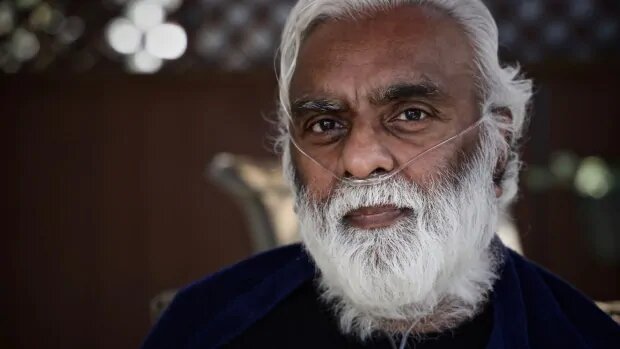When Atish Ram, 58, was admitted to Royal Columbian Hospital after testing positive for COVID-19, he had a neat, white goatee. When he was finally discharged 54 days later, he sported an impressive white beard.
The unchecked growth of facial hair marked the time stolen by the disease, but it was the 30 pounds he lost, the shortness of breath, the coughing and the oxygen bottle he keeps by his side that tell the story of COVID’s physical toll.
“The virus attacks your lungs, and what it did to me was it attacked my lungs, and it caused pneumonia,” said Ram a few days after he returned to his Surrey home on Saturday.
He had an underlying heart condition before contracting the virus, and his long hospital stay — in and out of the intensive care unit — was largely due to complications and the disease’s persistence.
Now that the province is continuing to resume regular activity, and measures taken to reduce the spread of the virus are easing, Ram wants his case to serve as a reminder that the pandemic isn’t over, and the virus can still find its way to vulnerable people — causing suffering or death.

On Tuesday, Provincial Health Officer Dr. Bonnie Henry announced four new COVID-19 cases in B.C. There are now 207 active cases of the virus across the province, the lowest number since a public health emergency was declared on March 17 — just four days before Ram started noticing COVID-19 symptoms.
“I am really worried about it,” said Ram of the rate that people are returning to normal behaviour. “Until a vaccine is found, nobody is safe.”
‘The most difficult thing that I had to do’
He said the duration of his hospital stay was a struggle, but the lowest point was about 10 days in, when he was in the ICU for the second time.

According to Ram, a nurse told him he’d likely be intubated — a procedure in which a tube is inserted down a patient’s throat to keep airways open — and put on a ventilator that night. He was told he could be in a coma for as much as a month and he should call his family.
“Basically he was telling me, you’ve got to say your last words to them, and it was the most difficult thing that I had to do,” said Ram. “They stabilized me enough so I could talk, then I was able to phone my wife and kids.”
Ram remembers it as a painful conversation, with tears on both ends of the line.
“That was really tough — I lost it,” said his wife, Mandy Ram. “It was scary … it was my worst nightmare that he might get intubated, but luckily he didn’t.”
After that, the roller coaster continued — there were good days, but more bad days, as issues with his heart, blood pressure, constipation and internal bleeding continued.
Ram’s family wasn’t allowed to visit — nobody was, and Ram said the medical staff avoided entering his room. YouTube videos and FaceTime chats punctuated the monotony and isolation.

“The fact that this fellow was in hospital for 54 days — it’s actually great that he was able to get better and get home,” said Dr. Steven Reynolds, the site medical director at Royal Columbian and a critical care physician. “We do occasionally see [COVID-19] patients that stay that long.”
‘A second wave’
Reynolds said he’s confident that public health leaders are striking an appropriate balance as they re-open business and activity in the province, but people ought to remain cautious.
“We can pretty confidently say that every pandemic in history has had a second wave,” he said. “There will be a point, a time when there will be a surge in cases, and we need to be ready and nimble in the community to respond to that.”
According to Reynolds, it’s not just a question of whether you catch the virus, but it’s the danger to people who are more likely to end up in the intensive care unit where he works.
It’s a sentiment echoed by Ram, who’s still concerned about contracting a mutated version of SARS-CoV-2 and experiencing the nightmare all over again.
“You’ve still got to be vigilant. You’ve got to be careful,” he said. “If not for yourself, think of others, because there are vulnerable people out there.”
Do you have more to add to this story? Email
Follow Rafferty Baker on Twitter: @raffertybaker
Source link


Be First to Comment